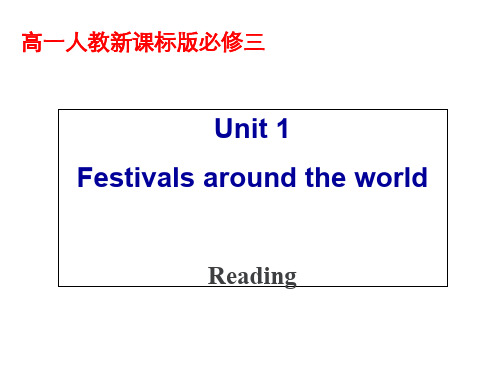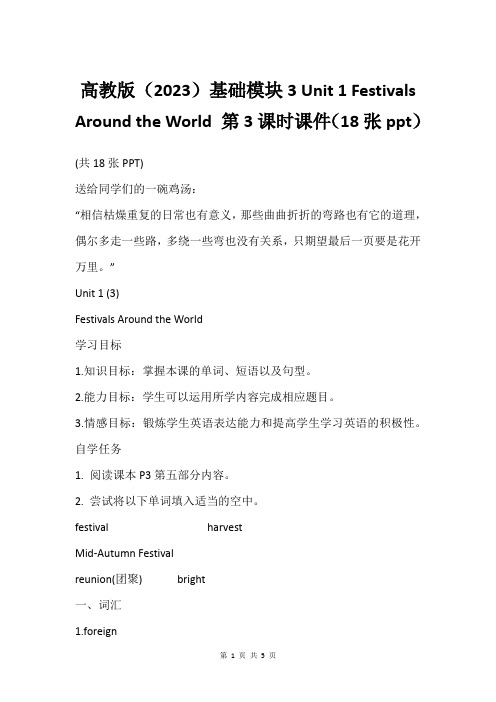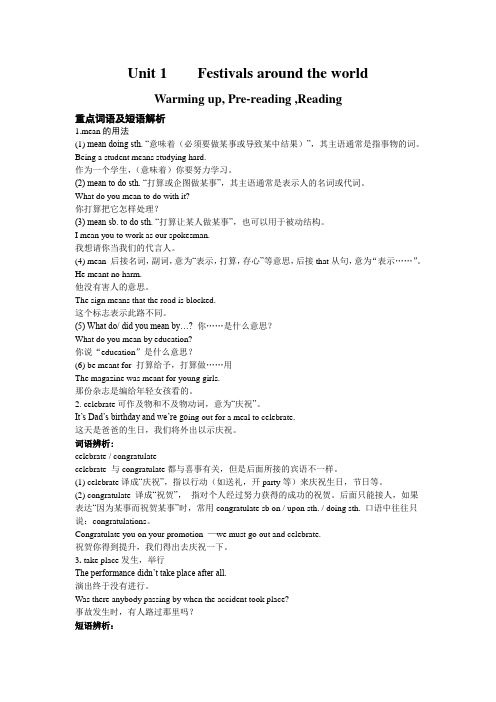高中英语 Unit 1《Festivals around the World》Period5 Using language Extensive reading教案5 新人教版
高中英语 必修三 Unit1《Festivals around the world ---Reading》

3. Qu Yuan was a great poet who people honor a lot in China. T
4. Mid-autumn Festival is held to celebrate the end of autumn. F
5. Easter celebrates the birth of Jesus. F
高一人教新课标版必修三
Unit 1 Festivals around the world
Reading
Guessing Compition:Guess what festival It is according to the picture you see as quickly as you can.
5. Name three things people do at Spring Festival.
eat dumplings, fish, meat; give children lucky money; dragon dances; visit family members
Festivals of the Dead: Fill in the blanks.
P 2. Festivals of the Dead Japan -----Obon Mexico------Day of the Dead America------Halloween P 3. Festivals to Honour People Dragon Boat Festival Columbus Day (India)October 2
2. Answer the following questions.
1. What are festivals of the dead usually for?
人教版高中英语必修一课文

人教版高中英语必修一课文
Unit 1《Festivals around the World》
本单元主要介绍了世界各地的节日,包括春节、万圣节、圣诞节、新年和复活节等。
文中除了介绍节日的由来和庆祝方式外,还涉及了一些文化背景和相关的习俗。
第一部分:读前探究
本部分通过图片、表格、问答等形式,引出了本单元的
主题:“世界节日”。
第二部分:课文阅读
本部分包括五个具有代表性的节日:中国的春节、美国
的万圣节、英国的圣诞节、印度教的新年和基督教的复活节。
每个节日都有相应的阅读材料和相关练习,旨在让学生掌握节日的历史和文化内涵。
第三部分:课文朗读
本部分以听力练习为主,通过听录音、模仿、评析等环节,帮助学生提高英语口语和听力能力。
第四部分:语言学习
本部分重点介绍了各节日中常用的词汇、短语和句型,
帮助学生理解和运用英语表达与节日庆祝相关的内容。
第五部分:课文扩展
本部分以学生自主学习为主,旨在扩展课文中涉及的文
化背景和节日庆祝方式,培养学生的文化意识和创新思维能力。
例如可以参与的活动包括:研究其他国家/民族的节日、设计
自己的节日等。
第六部分:写作训练
本部分通过例句分析和提供写作范文等方式,引导学生掌握如何用英语表达关于节日庆祝的内容,提高写作能力。
第七部分:文化背景
本部分重点介绍了各节日的文化背景和相关的习俗、传统,帮助学生加深对节日的认识和理解。
第八部分:单元测试
本部分为本单元的测试部分,主要包括听力测试、阅读理解和写作。
旨在检验学生对所学知识点的掌握情况,并为学生未来的学习提供参考。
必修3 Unit 1 Festivals around the world

【本讲教育信息】一、教学内容必修3 Unit 1 Festivals around the world(一)重点单词(二)重点短语(三)重点句型二、知识精讲(一)重点单词1. belief n. 信任;信仰;信心He has great belief in his doctor. 他对他的医生无比信赖。
He came to me in the belief that I could help him.他到我这里来,相信我能帮助他。
The cruelty of the murders was beyond belief.凶手的残忍让人难以置信。
知识拓展:believe vt. & vi. believable / unbelievable adj.They need a leader they can believe in.他们需要一个可以信赖的领导。
Believe it or not, he asked me to marry him.信不信由你,他向我求婚了。
—Does he still work there? 他还在那里工作吗?—I believe so / not. 我想是/不是。
2. gain vt. 获得;得到; 赢得He has gained rich experience in these years.这些年他已获取了丰富的经验。
He has gained the respect of his friends.他赢得了朋友们的尊重。
He gained weight after recovery from his illness.康复后他的体重增加了。
I gained a lot by / from my former experience.我从以前的经验中学到很多东西。
知识拓展n. 收益;利润No pains; no gains.(谚语)不劳无获3. gather vt.采集;收集;积累;聚集The farmers are gathering (in ) crops in the field.农民们正在田野里收割庄稼。
高教版(2023)基础模块3 Unit 1 Festivals Around the World 第

高教版(2023)基础模块3 Unit 1 Festivals Around the World 第3课时课件(18张ppt)(共18张PPT)送给同学们的一碗鸡汤:“相信枯燥重复的日常也有意义,那些曲曲折折的弯路也有它的道理,偶尔多走一些路,多绕一些弯也没有关系,只期望最后一页要是花开万里。
”Unit 1 (3)Festivals Around the World学习目标1.知识目标:掌握本课的单词、短语以及句型。
2.能力目标:学生可以运用所学内容完成相应题目。
3.情感目标:锻炼学生英语表达能力和提高学生学习英语的积极性。
自学任务1. 阅读课本P3第五部分内容。
2. 尝试将以下单词填入适当的空中。
festival harvestMid-Autumn Festivalreunion(团聚) bright一、词汇1.foreignadj.外国的,外来的foreigner【C】n. 外国人,外来人练习造句:他是一名外国学生。
2. vocation n.职业,工作vocational adj. 职业的,职业技术的vocational school:职业学校例:我在一所职业学校上学。
vacation n.假期v.度假summer vacation 暑假winter vacation 寒假go on vacation: 去度假例:我计划暑假去海南度假。
句子练习:1.她是一名职业学校的学生。
2.他的职业是一名警察。
He chose teaching as his _________ vocational B. vocationC. vacationD. vacational3. celebrate v. 庆祝,赞美celebration n. 庆祝,颂扬We had a________ in the hall yesterday.celebrated B. celebrateC. celebratesD. celebration4.familyfamily :“家人” ,不可数名词。
《高中英语新课标-必修1-Unit1 Festivals around the world 课件》

不同国家和文化中的节日
了解世界各国和不同文化中的庆典与节日,体验不同人群庆祝节日的方式, 感受文化的多样性与人类共同的欢庆。
节日的文化意义
探究节日在不同文化中的重要地位,了解它们对于文化传统、身份认同和价 值观的深远影响。
节日的历史渊源
追寻节日的历史根源,了解节日与人类历史和传统之间的联系,以及随着时 间推移如何演变和发展。
宗教节日及其意义
探索各大宗教中的重要节日,了解它们在信仰和宗教-必修1Unit1 Festivals around the world 课件
Explore the fascinating world of festivals! From cultural celebrations to religious traditions, discover the rich tapestry of festivals that bring joy and meaning to people around the globe.
为什么庆祝节日?
了解不同文化中庆祝节日的原因,从人们的欢乐和团结之中体会为什么庆祝节日的重要性。
世界各地不同类型的节日
探索世界各地独特的节日,从传统文化节日到现代庆典,领略各种不同类型 的节日给人们带来的喜悦与意义。
节日 - 生活的庆祝
了解节日作为人们庆祝与享受生活的方式,体验节日带来的喜庆氛围与人们 团聚的温暖。
人教版高中英语必修3 unit1 Festivals around the world 课件

Mexico
Halloween
western countries
Dragon Boat Festival
China
Festivals to Honor People
Columbus Day
USA
Festival to Honor Gandhi
India
Harvest Festivals
Thanksgiving
Unit 1 Festivals around the world
Spring Festival Christmas
Unit 1 Festivals around the world
Tibetan New Year
Unit 1 Festivals around the world
Task 1
Scanning
Easter and some western
carnivals
countries
Cherry Blossom Japan Festival
Kinds of Festivals
Names of Festivals
Countries
Obon
Japan
Festivals of the Dead
Day of the Dead
A. 生病 B. 发疯
C. 受伤 D. 挨饿
2.Which one is used to honour someone?
A. Spring Festival
B. Thanksgiving
C. Dragon Boat Festival
D. Mid-autumn Day
3. Which of the following is not mentioned?
高中英语-Unit_1_Festivals_around_the_worldAqAHMw

Unit 1 Festivals around the worldWarming up, Pre-reading ,Reading重点词语及短语解析1.mean的用法(1) mean doing sth. “意味着(必须要做某事或导致某中结果)”,其主语通常是指事物的词。
Being a student means studying hard.作为一个学生,(意味着)你要努力学习。
(2) mean to do sth. “打算或企图做某事”,其主语通常是表示人的名词或代词。
What do you mean to do with it?你打算把它怎样处理?(3) mean sb. to do sth. “打算让某人做某事”,也可以用于被动结构。
I mean you to work as our spokesman.我想请你当我们的代言人。
(4) mean 后接名词,副词,意为“表示,打算,存心”等意思,后接that从句,意为“表示……”。
He meant no harm.他没有害人的意思。
The sign means that the road is blocked.这个标志表示此路不同。
(5) What do/ did you mean by…? 你……是什么意思?What do you mean by education?你说“education”是什么意思?(6) be meant for 打算给予,打算做……用The magazine was meant for young girls.那份杂志是编给年轻女孩看的。
2. celebrate可作及物和不及物动词,意为“庆祝”。
It’s Dad’s birthday and we’re go ing out for a meal to celebrate.这天是爸爸的生日,我们将外出以示庆祝。
词语辨析:celebrate / congratulatecelebrate 与congratulate都与喜事有关,但是后面所接的宾语不一样。
Unit1_Festivals_around_the_world_Reading(包括语言点)教材

2019/4/23
in/for fun :开玩笑地,为了好玩 make fun of := laugh at 嘲笑,讥笑 have fun with : 和...玩的快乐/ 开心 We had fun with each other at the party held last Sunday. We are playing cards just for fun. fun : n [u] What fun it is to swim in summer!
2019/4/23
in memory of : 纪念,作为…的纪念 = to the memory of sb The museum was built in memory of the famous scientist. 类似短语有: in honor of in favor of in search of in charge of in need of
2019/4/23
award [ə'wɔːd]
n. 奖品,奖项,奖金, 助学金 ……
vt. 授予……裁定……奖励...... award sb sth = award sth to sb Mary got an award and was able to finish her study. She won the best actress award. reward n ,v 报酬,奖金,酬劳,奖赏
- 1、下载文档前请自行甄别文档内容的完整性,平台不提供额外的编辑、内容补充、找答案等附加服务。
- 2、"仅部分预览"的文档,不可在线预览部分如存在完整性等问题,可反馈申请退款(可完整预览的文档不适用该条件!)。
- 3、如文档侵犯您的权益,请联系客服反馈,我们会尽快为您处理(人工客服工作时间:9:00-18:30)。
Unit 1 Festivals around the worldPeriod 5 Using language: Extensive reading整体设计教材分析This is the fifth teaching period of this unit. As usual, the teacher should check students’ homework and offer chances for them to go over what they learned in the last period at the beginning of the class. Then lead in the new lesson.In this period, the teaching emphasis will be put on developing students’ reading ability by reading extensively. We will deal with two articles: A Sad Love Story in Using language on Page 7 and Winter Carnival in Quebec in Reading task on Page 44. While reading, get students learning to use some reading strategies such as skimming, scanning, and so on. As to new words and phrases, the teacher can first find those students feel most diffi cult and help them to understand. That’s enough here. The purpose of A Sad Love Story is to introduce a cross-cultural view of lovers’ festivals—Qiqiao Festival and Valentine’s Day. It is set in a present-day context that students can relate to, and respond to. The teacher can first talk about the famous Chinese sad love story of Zhinu and Niulang to lead in the topic and then ask students to read the passage and do some comprehending exercises. While checking their answers with the whole class, deal with l anguage problems students can’t work out by themselves. This is an extensive reading lesson, so the teaching steps should be simple. As to the part Reading task, its purpose is to introduce students to the Winter Carnival in Quebec, and to further their understanding of the reasons that people need to have festivals and what is done at them. Ask students to read through the passage and learn more about the foreign festival and its customs.At the end of the class, ask students to retell the two passages. In order to arouse students’ interest, the teacher can hold a competition between them.教学重点1. Develop students’ reading skills by extensive reading.2. Let students read and understand the two passages.教学难点1. Enable students to learn to use reading strategies such as skimming, scanning, and so on.2. Get students to understand foreign culture and customs.三维目标知识目标1. Get students to learn some useful new words and expressions in this part: apologize, drown, sadness, wipe, weep, remind, forgive, turn up, keep one’s word, hold one’s breath, set off, remind. . . of. . .2. Get students to read the story A Sad Love Story.3. Let students know more about the Quebec Carnival.能力目标1. Develop students’ reading skills by extensive reading and enable them to learn how to use different reading skills to read different reading materials.2. Enable students to tell about Qiqiao Festival and Valentine’s Day.3. Let students tell about the Quebec carnival with their own words.情感目标1. Stimulate students’ love of Chinese festivals and culture by learning foreign culture and custom.2. Develop students’ sense of group cooperation and teamwork.教学过程设计方案(一)→Step 1 Revision1. Check the homework exercises.2. Ask some pairs of students to come to the front and act out their dialogues to review and practice the expressions for requests and thanks.→Step 2 Warming up by brainstormingCan you tell something about Chinese Qiqiao Festival?Can you tell something about Valentine’s Day?Have you read any love stories? What are they?→Step 3 Reading1. Reading and judgingAsk students to read the passage fast and then decide whether each of the following statements is true or false.1)The girl Li Fang loved and waited for didn’t turn up, but he didn’t lose heart.2)Because her granddaughter got married to a human, the Goddess of Heaven got very angry.3)Zhinu was made to return to Heaven without her husband. They were not allowed to meet forever.4)Hu Jin had been waiting for Li Fang for a long time with a gift for him.Keys for reference: 1)F 2)T 3)F 4)T2. Reading and answeringAsk students to read the passage carefully, and answer the following questions.1)Why did Li Fang feel like a fool?2)What was Li Fang afraid that Hu Jin was doing?3)How did Li Fang know the manager wanted to shut the coffee shop?4)What is the reason why Li Fang and Hu Jin did not meet on time?5)Why was Li Fang so worried at the end of the story?3. Check the answers with the whole class and deal with any language problems.Keys for reference:1)Li Fang felt like a fool because he thought that he was waiting without any hope. /Hu Jin wouldn’t come to meet him.2)He was afraid that she was with her friends laughing at him.3)The manager wiped the tables, then sat down and turned on the TV.4)They didn’t meet on time be cause Li Fang waited in the coffee shop while Hu Jin in the tea shop.5)He was worried because he had thrown away the roses and chocolates/presents/gifts for Hu Jin and he had nothing to give her and he thought she would not forgive him.4. Reading and findingAsk students to read the passage aloud to the tape and underline all the useful expressions or collocations in the passage. Let students read them aloud and copy them down in their exercise book after class as homework.Collocations: be heart-broken, Valentine’s Day, a coffee shop, after work, turn up, laugh at, keep one’s word, look forward to, hold one’s breath, drown one’s sadness in coffee, the Goddess of Heaven, the weaving girl, on earth, the herd boy, fall in love, get married, be married to, the Milk Way, once a year, be able to, set off, throw. . . away, remind. . . of, . . .→Step 4 Discussion1. After students’ reading the passage, ask them to work in groups and discuss the following questions:1)Why was the TV story what Li Fang needed?2)Why do people want the weather to be fine on Qiqiao Festival?3)What more do you know about Qiqiao Festival?4)Are you satisfied with the ending of the story? If not, how are you going to rewrite it?2. Ask students to start their discussion. Make sure that every student has a chance to express his/her ideas.3. Ask each group to choose one student as their representative. Let as many group representatives as possible come to the front and give a report of what their group has discussed.→Step 5 Reading taskTell students: We have learned some knowledge of festivals around the world from the reading passage Festivals and Celebrations. We have also learned about the Trinidad Carnival. Do you want to know about the Quebec Carnival? Please Turn to Page 44 and read the passage Winter Carnival in Quebec.1. Ask students to read the passage fast to get the general idea.2. Let students read the passage carefully and then answer the following questions.1)Why do you think that dogs are used to pull sleds in cold climates?2)Which activity at the Carnival do you think would be the most fun? Why?3)Which activity at the Carnival do you think would be the most dangerous? Why?4)If you could go to the Quebec Carnival, what would you do or see? Why?5)If you had to draw a poster for the Carnival, what things would you put on the poster?6)What would you wear if you went to the Carnival? Name at least three things.3. Check the answers with the whole class after most of them finish.Keys for reference:1)Dogs are used in cold climates because they can run on top of the snow, which horses cannot/because they have very thick fur which keeps them warm. They are also very strong/do not eat grass and grain as horses and cattle do/can be fed on meat/do not eat too much.2)Students give their own answers.3)Probably the canoe race through the ice would be the most dangerous.4)Students give their own answers.5)Students give their own answers.6)I would wear a warm coat/jacket/hat/gloves/mittens/boots/underwear/scarf/socks.4. Have students compare Harbin with Quebec.1)Talk about Harbin with students.What do you know about Harbin?2)Let students fill in the chart.City Similarity DifferenceHarbinQuebec→Step 6 Important language points1. But she didn’t turn up.可她却不见人影。
